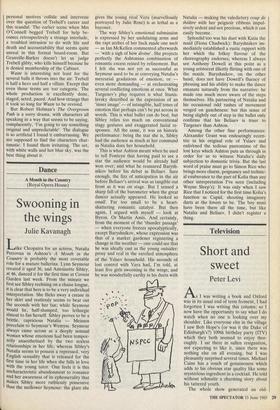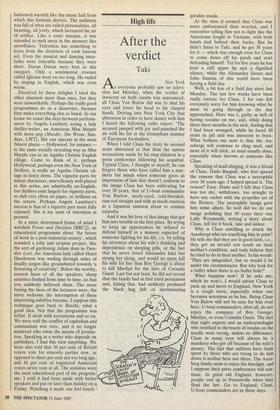Television
Short and sweet
Peter Levi
As I was writing a book and Oxford was in its usual end of term ferment, I had forgotten I was writing this column; so I now have the opportunity to say what I do watch when no one is looking over my shoulder. Like everyone else in the village I saw Bob Hope's (or was it the Duke of Edinburgh's?) 109th birthday party (ITV) which they both seemed to enjoy thor- oughly. I sat there in sullen resignation, not expecting to like it, since there was nothing else on all evening, but I was pleasantly surprised several times. Michael Caine has a touch of genuineness which adds to his obvious star quality like some mysterious ingredient in a cocktail. He told without schmaltz a charming story about his tattered youth.
The whole show generated an old- fashioned warmth like the music hall from which this formula derives. The audience was full of what are called personalities, all beaming, all jowly, which increased the air of artifice. Like a court masque, it was intended to melt away in the memory like snowflakes. Television has something to learn from the shortness of each famous act. Even the musical and dancing inter- ludes were tolerable because they were short. Duran Duran were best in this category. Only a sentimental crooner called Iglesias went on too long. He ended by singing in English, which was even worse.
Deceived by these delights I tried the other channels more than once, but they were unwatchable. Perhaps the really good programmes do us a disservice, because they make everything else so banal. In our house we count the days between perform- ances by Angela Lansbury acting a lady thriller-writer, an American Miss Marple with more pep (Murder, She Wrote, Sun- days, LWT). She can operate in the most bizarre places — Hollywood, for instance — in the same socially revealing way as Miss Marple can in an Agatha Christie English village. Come to think of it, perhaps Hollywood, perhaps even the New York of thrillers, is really an Agatha Christie vil- lage in fancy dress. The vignette parts for minor characters, marvellously well played in this series, are admittedly un-English, but thrillers exist largely for vignette parts, so dull very often on paper, so brilliant on the screen. Perhaps Angela Lansbury's success is that of a vignette part more fully exposed. She is my saint of television at present.
In a more determined frame of mind I watched Power and Decision (BBC2), an educational programme about 'the future of work in a post-industrial society', which sounded a jolly and utopian project, like the sort of gardening Adam does in Para- dise Lost. An American lady called Hazel Henderson was wading through miles of deadly jargon like groundweed towards 'a flowering of creativity'. Below the worthy, earnest faces of all the speakers, sharp statistics flashed from time to time, so that you suddenly believed them. The more boring the faces of the lecturers were, the more welcome the interruption of these interesting subtitles became. I suppose this technique goes back to Brecht; what a good idea. Not that the programme was leftist. It dealt with ecosystems and so on. We were told the conflict of capitalism and communism was over, and it no longer mattered who owns the means of produc- tion. Speaking as a writer who depends on publishers, I find this view surprising. We were also told that 36 per cent of Britishi voters vote for minority parties now, as opposed to three per cent not too long ago, and 48 per cent of registered American voters never vote at all. The statistics were the most educational part of the program- me; I wish it had been made with better speakers and put on later than midday on a Friday. Watching it made one feel lonely.



















































 Previous page
Previous page